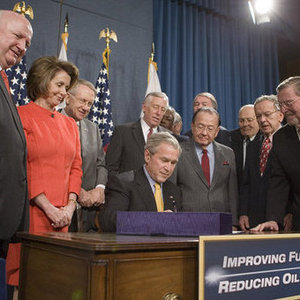RFA: RFS2 “has unquestionably lived up to its promise”

PHOTO: White House photo by Joyce N. Boghosian
December 19, 2018
BY Renewable Fuels Association
Eleven years ago, President George W. Bush signed into law what has become the single most successful clean fuels policy in the United States—the expanded Renewable Fuel Standard (RFS2). The RFS2, included in the Energy Independence and Security Act of 2007, requires petroleum refiners and importers to blend annually increasing volumes of renewable fuels with gasoline and diesel, culminating with 36 billion gallons in 2022. Since enactment, the United States has experienced cleaner air, greater energy security, revived economic activity in rural areas, and more affordable choices at the pump.
Among the numerous benefits since signed into law, the RFS has:
- Helped clean the air. The greenhouse gas emissions avoided from using ethanol has increased four-fold from 12.7 million tons CO2e in 2007 to 55 million tons CO2e in 2018. Carbon monoxide and particulate matter emissions are down as well, as is the concentration of ground-level ozone.
Advertisement
Advertisement
- Boosted energy security. U.S. dependence on imported crude oil and petroleum products fell from 58 percent in 2007 to just 14 percent in 2018, thanks in large part to growth in the use of ethanol and other biofuels.
- Lowered fuel prices. Because ethanol is priced below gasoline and far below competing octane sources, the RFS has led to lower gas prices for consumers. One recent study found ethanol reduces spending on gasoline by $142 per American household.
Advertisement
Advertisement
- Supported jobs and economic activity. Since enacted, the number of jobs supported by the ethanol industry has increased by 53 percent–from 238,541 jobs in 2007 to 365,491 in 2018. Additionally, the industry generates more than $40 billion in GDP every year.
“The RFS has unquestionably lived up to its promise,” said RFA President and CEO Geoff Cooper. “It has lowered consumer fuel prices, decreased reliance on imported petroleum, reduced emissions of harmful tailpipe pollutants and greenhouse gases, supported hundreds of thousands of jobs in rural America, and added value to the crops produced by our nation’s farmers. With proper oversight and implementation, the program will continue to drive innovation, support rural economies, and provide cleaner and more affordable fuel choices at the pump,” he added.
Related Stories
President Trump on July 4 signed the “One Big Beautiful Bill Act.” The legislation extends and updates the 45Z credit and revives a tax credit benefiting small biodiesel producers but repeals several other bioenergy-related tax incentives.
CARB on June 27 announced amendments to the state’s LCFS regulations will take effect beginning on July 1. The amended regulations were approved by the agency in November 2024, but implementation was delayed due to regulatory clarity issues.
SAF Magazine and the Commercial Aviation Alternative Fuels Initiative announced the preliminary agenda for the North American SAF Conference and Expo, being held Sept. 22-24 at the Minneapolis Convention Center in Minneapolis, Minnesota.
Saipem has been awarded an EPC contract by Enilive for the expansion of the company’s biorefinery in Porto Marghera, near Venice. The project will boost total nameplate capacity and enable the production of SAF.
Global digital shipbuilder Incat Crowther announced on June 11 the company has been commissioned by Los Angeles operator Catalina Express to design a new low-emission, renewable diesel-powered passenger ferry.
Upcoming Events










